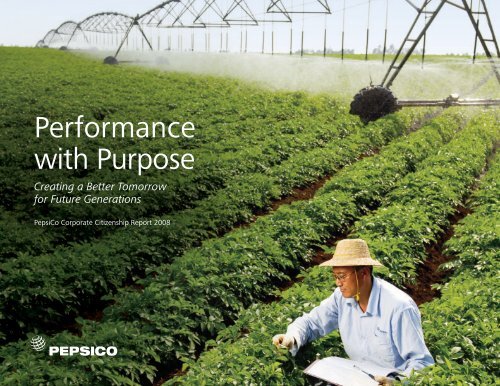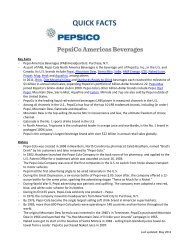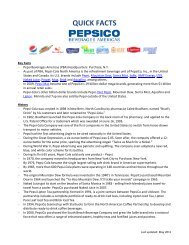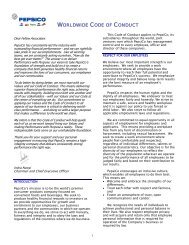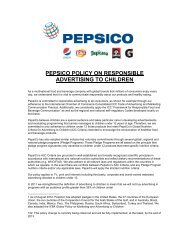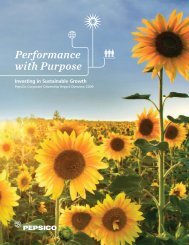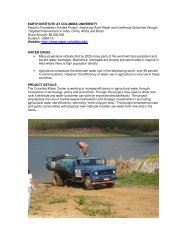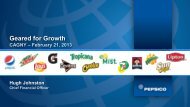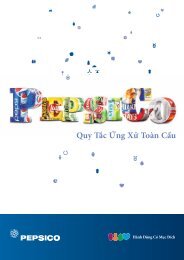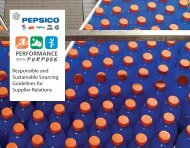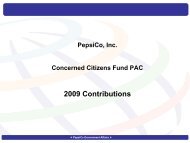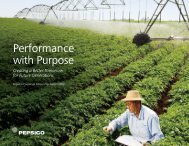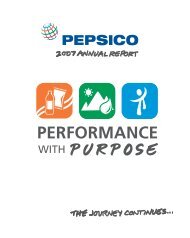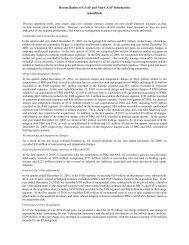Download our 2008 Sustainability Report Overview - PepsiCo
Download our 2008 Sustainability Report Overview - PepsiCo
Download our 2008 Sustainability Report Overview - PepsiCo
Create successful ePaper yourself
Turn your PDF publications into a flip-book with our unique Google optimized e-Paper software.
Performancewith PurposeCreating a Better Tomorrowfor Future Generations<strong>PepsiCo</strong> Corporate Citizenship <strong>Report</strong> <strong>2008</strong>
As one of the world’s largest food and beverage companies, we recognize <strong>our</strong> responsibility to help make a positivecontribution in a world that continues to experience unprecedented economic, environmental, and social challenges.In this overview, we share <strong>our</strong> progress in addressing these challenges, identify where we believe we can have the most impact,and acknowledge <strong>our</strong> opportunities for continued improvement. We will continue to develop, improve, and report metrics to measure<strong>our</strong> global performance. While this process will take time, we believe that it will help us both embed sustainability goals more fullyinto <strong>our</strong> operations and achieve demonstrable progress.Our approach to sustainability remains grounded in <strong>our</strong> Performance with Purpose mission: a balance of achieving continuedfinancial success while leaving a positive imprint on society. Specifically, we have defined three areas of influence: human, environmental,and talent sustainability.Human <strong>Sustainability</strong>N<strong>our</strong>ishing <strong>our</strong> consumers throughthe products we offer — from treats tohealthy eats — and through <strong>our</strong> effortsto enc<strong>our</strong>age more active lifestyles.Environmental <strong>Sustainability</strong>Protecting <strong>our</strong> natural res<strong>our</strong>ces andoperating in a way that minimizes <strong>our</strong>environmental footprint.Talent <strong>Sustainability</strong>Involving and empowering people,helping them to realize their potential,renew themselves and achieve success.This report provides a review of all three areas and offers a more in-depth look at <strong>our</strong> company’s efforts with respect to water,climate change and agriculture.We believe that the power of <strong>our</strong> global workforce, coupled with <strong>our</strong> operational capabilities and international reach, provide<strong>our</strong> company with a unique opportunity to have a positive impact on society. Our employees are committed to living <strong>PepsiCo</strong>’ssustainability vision, which is to continuously improve the world in which we operate, creating a better tomorrow for thisgeneration, as well as future generations.This report covers the <strong>2008</strong> fiscal year.Additional expanded content for each area of sustainabilitycan be found online at www.pepsico.com/sustainabilityreport.Cover image: A member of <strong>our</strong> agriculture team practices water conservation techniques on the ZhanJiang potato farm inthe Guangxi region of China. Today, agriculture accounts for more than 70% of water consumed globally, and this can beas high as 90% in developing countries. In China, <strong>our</strong> team grows potatoes in desert conditions through the installation ofpivot and drip irrigation systems. These systems have reduced <strong>our</strong> agricultural water consumption by up to 50% in China.Our agronomists also have taught more than 5,000 local farmers and university students advanced techniques ofsustainable agriculture to yield better crops, protect the environment and help support the economic development of localfarming communities.
Dear Fellow Stakeholders,Every day, <strong>PepsiCo</strong> earns its license to operate in the thousandsof communities we serve.As one of the world’s largest food and beverage companies,we have some distinct responsibilities. We have a responsibilityto support economic development, to improve <strong>our</strong> environmentalfootprint and to help work toward solutions to issuessuch as obesity and undern<strong>our</strong>ishment. This report, calledPerformance with Purpose: Creating a Better Tomorrow forFuture Generations, captures the progress we have madethus far, and provides a map of where we intend to go.Performance with Purpose is fundamental to <strong>our</strong> overallsuccess. There’s no question that these are challengingtimes. Like many companies, we’re facing headwinds suchas rising costs, an uncertain economic outlook and shiftingcurrency exchange rates. While we can’t control macroeconomictrends, we must adapt to the near-term challengesto deliver on <strong>our</strong> long-term growth plans.But this cannot be an excuse to reduce <strong>our</strong> commitment toresponsible business. Indeed, financial performance can andmust go hand in hand with sustainability. Our performance and<strong>our</strong> purpose are not separate — each is knitted inextricablywith the other. That relationship can be seen in the three areasthat together comprise Performance with Purpose: Human,Environmental and Talent sustainability. These focus areaswill guide the way we do business. They will continue to beshaped in dialogue with key stakeholders. In this way, weintend to maintain <strong>our</strong> long-term commitment to the overallsustainability of <strong>our</strong> company.Human <strong>Sustainability</strong>The world today faces many public health challenges and,as a responsible company, we recognize <strong>our</strong> part in helpingto improve the well-being of populations in both developedand developing countries.Our aim is to n<strong>our</strong>ish consumers by developing productsthat satisfy the consumer’s changing preferences and thatdeliver exceptional taste and convenience. Increasingly, <strong>our</strong>product portfolio makes it more enjoyable to lead a healthylife. We’re changing because <strong>our</strong> consumer is changingand because the health of the world’s growing populationdemands it.To meet this demand, we’ve appointed new leaders to <strong>our</strong>global R&D team, including world-renowned clinical scientists.We have increased <strong>our</strong> R&D investment and dramaticallyexpanded <strong>our</strong> capabilities. We have accelerated <strong>our</strong> innovationpipeline, acquired companies to extend <strong>our</strong> offerings of morenutritious products and actively cultivated partnerships toguide <strong>our</strong> work. We will use <strong>our</strong> influence to drive positivechange in the food industry.Environmental <strong>Sustainability</strong>As a responsible company, we seek to continually driveenvironmental sustainability by abiding by applicable lawsand regulations and, in certain instances where we believethe requirements may not be sufficiently advanced, weapply higher standards.Recently, Bureau Veritas issued independent verification of<strong>our</strong> environmental data. We will continue to audit <strong>our</strong> performance,share <strong>our</strong> progress and actively lead and engagein private-public partnerships to spur action and solutionsto address the world’s environmental issues.But we want to go further than that. We have focused <strong>our</strong>environmental sustainability efforts on the areas where,because of <strong>our</strong> expertise, we can have the most impact:water, climate change, agriculture and packaging. We areworking hard to minimize <strong>our</strong> water footprint and improvepublic access to clean water through alliances with nonprofitgroups such as The Earth Institute and Water.org. We areintent on mitigating climate change and continuing <strong>our</strong>efforts to reduce greenhouse gas emissions. After more thana decade of action, we continue to form partnershipswith key stakeholders such as the Carbon Trust to provideus with additional insights, expertise and knowledge.Talent <strong>Sustainability</strong>By valuing <strong>our</strong> employees, we are ensuring that <strong>PepsiCo</strong>is the kind of company where talented people of all backgroundswant to work.We recognize <strong>our</strong> responsibility to take care of <strong>our</strong> employeesand their families, especially during this global economicdownturn. We remain committed to providing opportunitiesfor <strong>our</strong> associates to acquire new skills, grow professionallyand share in <strong>our</strong> company’s success. Our dedication toworkplace safety is unwavering, and we offer health carebenefits and wellness programs that enable <strong>our</strong> employeesto live healthier lives.We foster an inclusive workplace by increasing female andminority representation in management ranks, creatingrewarding opportunities for people with disabilities andrecognizing <strong>our</strong> employees for their contributions.We are extending <strong>our</strong> human rights standards throughout<strong>our</strong> operations and enc<strong>our</strong>age <strong>our</strong> suppliers andagricultural partners to uphold <strong>our</strong> commitment tosustainable development.ConclusionI believe <strong>our</strong> Performance with Purpose mission defines<strong>our</strong> roles and responsibilities very clearly. It motivates <strong>our</strong>198,000 employees to be leaders in social responsibilityand helps each of us create a better tomorrow for futuregenerations. We look forward to sharing <strong>our</strong> progress andI look forward to y<strong>our</strong> feedback. I enc<strong>our</strong>age you to sharey<strong>our</strong> comments on <strong>our</strong> corporate citizenship report atPerformanceWithPurpose@pepsico.com.Indra K. NooyiChairman and Chief Executive Officer
HUMAn SUSTAInAbIlITyWe Recognize Our Responsibilityto Provide Balanced NutritionMEHMOOD KHAn, MD, Chief Scientific OfficerAs one of the world’s largest food and beveragecompanies, we believe it is <strong>our</strong> responsibility to understandthe diet and nutrition needs of populations aroundthe globe.More than ever, consumers want products that are safe,affordable, great-tasting and healthy. They are increasinglylooking closely at the nutritional content of the productsthey consume and purchase for their families, such as saltcontent and saturated fat, because they want to eat welland improve their overall health. They want options thatoffer nutritional benefits to meet the differing needs ofvarious life stages, from childhood through late adulthood.Consumers are also managing specific health conditions,such as diabetes and high cholesterol, and expect onpackhealth claims to be grounded in credible science.Understanding these health needs and attitudes is vital to<strong>our</strong> business, but the global market is even more dynamicand complex.Today, more than one billion adults are overweight orobese while at the same time, more than one billion adultsand children are undern<strong>our</strong>ished — in both developing anddeveloped countries. Often these overweight and undern<strong>our</strong>ishedindividuals live side by side in the same cities andcommunities, a paradox that has never been observed tothis scale in the history of mankind. The projected rise ofglobal obesity and global hunger presents a tremendouschallenge to the health and viability of individuals andcommunities.We’re mindful of the way the world is changing. How wechoose to respond to these societal challenges is criticalto the future of <strong>our</strong> business and to <strong>our</strong> planet. This is whywe are changing the way we innovate at <strong>PepsiCo</strong>.In <strong>2008</strong>, we expanded <strong>our</strong> global research and developmentcapability to address these challenges. Our networkof senior leaders includes world-renowned clinical scientistsand experts in science, technology, nutrition, foodscience and safety, public health, epidemiology, productdevelopment, behavioral medicine and health policy.These experts give <strong>PepsiCo</strong> a unique understanding ofindividual human physiology and the nutrition needsof populations. These global R&D teams are developingproducts rooted in rigorous, science-based nutritionstandards and produced to the highest standards of quality,with the promise of satisfying a diverse global palette.The hub of this work is eight regional research centers, eachfocused on leveraging nutrition science and knowledge todevelop convenient foods and beverages that can improveoverall diets and positively impact health. Three centers arelocated in the United States: Valhalla, N.Y.; Plano, Tex.;and Barrington, Ill. Other centers are in Leicester, UnitedKingdom; Monterrey and Mexico City, Mexico; Shanghai,China; and New Delhi, India; with “satellite” centers inThailand, Brazil and Australia. In addition, we’re broadening<strong>our</strong> open innovation efforts through new research partnershipswith leading institutions, including: Yale University,Dresden University, Westfälische Wilhelms-UniversitätMünster, and several universities in India.4 <strong>PepsiCo</strong> Corporate Citizenship <strong>Report</strong> <strong>2008</strong>
We’re introducing products with more whole grains, fiber,fruits and vegetables, and are reformulating some of<strong>our</strong> existing products by reducing trans fats to negligiblelevels while also reducing total fat, saturated fat, salt andadded sugar. We’re dedicated to ensuring the integrity of<strong>our</strong> health claims, all of which are reviewed by qualifiednutrition and regulatory experts following strict proceduresand standards.Members of the Walkers R&D team focus on science-based nutritionstandards as they develop food and beverage products at the state-of-theartBeaumont Park research and development facility in Leicester, U.K.We’re helping consumers make smart choices more easilyby providing easy-to-understand nutrition labeling.We also understand the importance of being a responsiblemarketer. <strong>PepsiCo</strong> believes that industry-wide voluntaryaction continues to be the best way to address <strong>our</strong>responsibilities. We endorse the International Council ofBeverages Associations’ guidelines on marketing tochildren — a landmark industry initiative which does notpermit marketing or advertising of beverages, other thanwater, fruit juice and dairy-based beverages, to childrenunder 12 years old.We are committed to helping reduce the terrible burdenof hunger everywhere we do business. <strong>PepsiCo</strong> has effortsunder way to help support the United Nations’ MillenniumDevelopment Goals, including the goal to eradicateextreme poverty and hunger by 2015. In addition tofunding, we are providing experts who offer counsel inmany areas—from product development to buildingdistribution networks—in such countries as India, SouthAfrica and Nigeria. In addition, we’ll have the opportunityto leverage any new discoveries to create affordableproducts for low-income consumers in developed countriesaround the world.We know the importance of establishing partnershipswith key stakeholders to help make a positive contributionto the world’s nutrition needs. Our leaders contributeto initiatives led by the World Health Organization (WHO),the National Institutes of Health, Global Alliance forImproved Nutrition, the Pan American Health Organizationand the Alliance for a Healthier Generation. For example,we are among the nine leading food and beverage companiesto commit to the goals of the “Global Commitmentto Action on the Global Strategy on Diet, Physical Activityand Health” and to report on <strong>our</strong> progress, annually,at the World Health Assembly. We intend to continuemeasuring and reporting on <strong>our</strong> progress so that <strong>our</strong>consumers and other industry leaders can share in thelessons we’re learning.We’ve acquireda stake inJSC Lebedyansky,the world’ssixth largest juicemanufacturer.Across <strong>our</strong> global portfolio, we are offering consumerssmaller portion sizes. In fact, in the United Kingdom,a greater proportion of <strong>our</strong> sales come from smallerportion sizes. Over 80% of Walkers Crisps sales are from25 gram bags purchased in multipacks; 2% of sales arefrom 50 gram bags. Our goal is to continue to developproducts that are affordable and accessible. We do notcharge a premium for <strong>our</strong> zero sugar/zero calorie varieties,for instance.Every serving ofSunBites contains morethan one-third of thesuggested daily amountof whole grains.At <strong>PepsiCo</strong>, we’re privileged to use the lessons gainedfrom <strong>our</strong> global vantage point not only to improve<strong>our</strong> business, but to contribute to <strong>our</strong> common goal offinding solutions to some of the world’s most persistentsocial challenges.<strong>PepsiCo</strong> Corporate Citizenship <strong>Report</strong> <strong>2008</strong> 5
HUMAn SUSTAInAbIlITyWe Are Committed to Making Products thatHelp Consumers Live Active, Healthy LivesTransforming Our PortfolioAt <strong>PepsiCo</strong>, <strong>our</strong> aim is to continually develop products thatsatisfy consumers’ changing preferences, deliver exceptionaltaste and offer greater nutritional benefits. Increasingly, <strong>our</strong>portfolio of foods and beverages are part of a diet that is moreenjoyable and supports a healthy lifestyle. We’re changingbecause consumers are changing and because the healthof the world’s growing population demands it. Healthiereating is good for the well-being of <strong>our</strong> consumers andis good for business.Innovating new ProductsAs a leading innovator in the food and beverage sector, <strong>our</strong>pipeline of products offers a diverse array of locally relevanttastes and enhanced nutritional benefits. Here are someexamples:• In Mexico, <strong>our</strong> Gamesa-Quaker business expanded its lineof portion-controlled, oat-based cookies and snacks.• In India, we’re making snacks with an ingredient veryfamiliar to the local diet — lentils.• In Brazil, we expanded <strong>our</strong> offerings of baked snacks; andwe’ve introduced low-fat bread snacks in Chile, PuertoRico, Spain, Turkey, Saudi Arabia and Russia.• <strong>PepsiCo</strong> and the Whole Earth Sweetener Companyintroduced a zero-calorie, all-natural sweetener derivedfrom the stevia plant. It’s called PureVia and it wasintroduced in Peru in a new, nutritionally enhanced<strong>PepsiCo</strong> beverage called “SoBe Life.”Enabling a Healthy DietOur commitment to improving <strong>our</strong> portfolio’s role in a dietincludes reinforcing the basic rules of a healthy diet. Thisrequires making changes that improve the nutrition contentof each product. As a result, we continue to make everycalorie count by reformulating some of <strong>our</strong> existing products6 <strong>PepsiCo</strong> Corporate Citizenship <strong>Report</strong> <strong>2008</strong>by reducing trans fats to negligible levels, adding wholegrains, and reducing added sugars. For example:• In India, we’re using rice bran oil instead of palm oil,reducing saturated fats by 40%.• In the United States, Tropicana Pure Premium Orange Juicehas two servings of fruit in every 8-ounce serving andoffers a juice variety with added calcium and Vitamin D.• In the United Kingdom and Europe, we’ve introducedWalkers Baked and Baked Lay’s with 70% less totalfat than regular crisps.• In <strong>2008</strong>, <strong>PepsiCo</strong> was the largest seller of nuts and seedsoutside the United States.Expanding through Strategic AcquisitionsAs <strong>our</strong> business grows globally, key acquisitions have helpedus expand <strong>our</strong> offering of products with improved nutritionalprofiles. The focus on more nutritious offerings started withthe acquisition of Tropicana in 1998 and the 2001 mergerwith Quaker Oats, including Gatorade. More recently, <strong>PepsiCo</strong>has acquired or purchased a major stake in: JSC Lebedyansky,Russia’s leading branded juice company and the world’s sixthlargestjuice manufacturer; Sandora, a leading juice companyin Ukraine; Naked Juice, a premium juice company in theUnited States; Spritz International Inc., the leading maker ofsunflower and pumpkin seeds in Canada; and V Water inthe United Kingdom.Promoting Active, Healthy lifestylesWe support programs that use simple steps to enc<strong>our</strong>agepeople to get active:• In Latin America, Vive Saludable Escuelas is a proveninitiative that teaches children how to add physical activityto their daily lives. A physical education routine, designedby Mexico’s Sports Commission, is being used by teachersin participating schools. To date, the program has touchedmore than one million children in 4,000 schools.• In India, <strong>our</strong> Get Active program reaches 70,000 studentsin 120 schools and promotes an active lifestyle throughan energy balance curriculum.• In the U.S., we continue to work with the YMCA, the largestprovider of fitness programs, to support Activate America,a public health initiative that helps make healthy livinga reality for millions of Americans.Helping Consumers Make better Choiceswith nutrition labelingWe care about the health of consumers. We want them toenjoy <strong>our</strong> products and we want to help make healthfulfood choices the easier choice.A key way we do this is through <strong>our</strong> own nutrition labeling.In the U.S., we were the first in the industry to introduce asymbol that makes it easier for consumers to identify whichof <strong>our</strong> products contribute to a healthier lifestyle. OurSmart Spot symbol — the symbol of Smart Choices MadeEasy — is a simple labeling system that explains why eachproduct is a smart choice.<strong>PepsiCo</strong> is also a founding member of the U.S. KeystoneFood and Nutrition Roundtable, a multi-stakeholder groupthat seeks to drive improvements in the American diet.The Keystone Roundtable is a consensus forum of industry,academia, the public health community and government,working collaboratively to create an easy-to-understand anduniform front-of-pack nutrition labeling program to helpconsumers make healthier choices among all packaged foodand beverages products in the U.S.In Europe, we introduced front-of-pack nutritional labelingacross <strong>our</strong> brands in partnership with other food and beveragecompanies. The labels help consumers understand thepercentage of the “Guideline Daily Amount” (GDA) of calories,sugars, saturates, fat and salt contained in a portion offood or drink.
Engaging in Responsible Marketingand AdvertisingWe understand the importance of being a responsiblemarketer. We believe that industry-wide voluntary actioncontinues to be the best way to address <strong>our</strong> responsibilities.We announced <strong>our</strong> full support of the International Councilof Beverages Associations’ guidelines on marketing tochildren — a landmark initiative supported by industry. Theguidelines permit no marketing or advertising of beverages,other than water, fruit juice and dairy-based beverages, tochildren under 12 years old. These guidelines were fullyimplemented on a global basis by January 2009. We were afounding member of a voluntary U.S. food and beverageindustry initiative that redefined how the industry marketsproducts to children under 12. Today, 100% of <strong>our</strong> advertisingto children is devoted exclusively to products that meetdefined nutrition criteria or provide a functional benefit.We have committed to similar guidelines in Canada, theEuropean Union, Mexico, Thailand, South Africa, Australiaand New Zealand.We’ve introducedBaked Walkers andBaked Lay’s with70%less total fat than regularcrisps, in the UnitedKingdom and Europe.We’ve introduced a lineof more healthful snacksin Mexico includingStila bars, made withoats and real fruit.Partnering for ChangeWe proactively lead and engage in private-public partnershipswith key external experts and stakeholders in theglobal health policy and science/nutrition communities tohelp improve diets and deliver substantial improvements in<strong>our</strong> products. Our leaders actively participate in globalhealth policy initiatives including those led by the WorldHealth Organization, the National Institutes of Health,Wellcome Trust, the Pan American Health Organization andthe Alliance for a Healthier Generation, among others.We are among nine leading food and beverage companiesto sign the “Global Commitment to Action on the GlobalStrategy on Diet, Physical Activity and Health,” a commitmentaddressed to the World Health Organization. Weagreed to five key global commitments to action that willtake place over the next five years. We will report <strong>our</strong> progressin delivering these goals at the annual World HealthAssembly meeting.We’ve introducedlow-fat bread snacksin Chile, Puerto Rico,Spain, Turkey, SaudiArabia and Russia.Sabra hummus provides ahealthier snack with zerotrans fat and zerocholesterol per serving.In the United States,Tropicana orange juicevarieties include addedcalcium and vitamin D.Old Fashioned QuakerOats is made with100%natural whole grainoats and can helpreduce cholesterol.<strong>PepsiCo</strong> Corporate Citizenship <strong>Report</strong> <strong>2008</strong> 7
EnVIROnMEnTAl SUSTAInAbIlITyWe Recognize Our Responsibility toMinimize Our Environmental FootprintlESlIE STARR KEATInG,Senior Vice President, Frito-Lay OperationsEvery day, we rely on the earth’s natural res<strong>our</strong>ces to run <strong>our</strong>businesses. Water is essential for all foods and <strong>our</strong> ability toenjoy them — from growing and washing to processing andcooking. It is the primary ingredient in <strong>our</strong> beverages.Fuels, electricity and, increasingly, other forms of energy areindispensable to making, moving and selling <strong>our</strong> products.As a company that is expanding across many developed andemerging markets, we are committed to minimizing theimpact <strong>our</strong> business has on the environment with methodsthat are socially responsible, scientifically based andeconomically sound.Our environmental sustainability efforts are primarily focusedon water, climate change, agriculture and packaging — areasthat are critical to <strong>our</strong> business and where we can make thebiggest impact. We continuously improve <strong>our</strong> environmentalprograms and explore inventive solutions to the world’schallenges, in particular water scarcity and climate change. Welook for ways to bring to scale the good ideas being implementedacross <strong>our</strong> global business and to share this experiencewith <strong>our</strong> peers and supply chain. The following pages spotlightinitiatives taking place around the world — in Mexico, India,the U.K. and the U.S. — and illustrate how we approach <strong>our</strong>commitment to sustainability.Our ability to improve the effectiveness of <strong>our</strong> environmentalsustainability initiatives has been strengthened by the creationof common, enterprise-wide metrics. This is helping us tobetter understand and track <strong>our</strong> comprehensive environmentalfootprint and to be more transparent in <strong>our</strong> reporting.Our goal is to reduce water consumption by 20%, electricityconsumption by 20%, and fuel consumption by 25%per unit of production by 2015 as compared to <strong>our</strong> 2006consumption. We’ve made notable progress in all three areas.For the first time ever, Bureau Veritas issued a verification of<strong>our</strong> environmental data and we are reporting <strong>our</strong> results on thetotal business, rather than by operating division as in the past.Reduce waterconsumption by20%Reduce electricityconsumption by20%Reduce fuelconsumption by25%We are also keen to address other areas of opportunities,including gathering consolidated bottler data and continuingto embed <strong>our</strong> global sustainability strategies and goals withinall <strong>our</strong> businesses for greater consistency.<strong>PepsiCo</strong>’s sustainability efforts are guided by a dedicatedEnvironmental <strong>Sustainability</strong> Leadership Team supportedby an Environmental Council. <strong>Sustainability</strong> teams at <strong>our</strong>manufacturing facilities around the globe are at the front lineof <strong>our</strong> efforts. Employee volunteer “Green Teams” operateat many U.S.-based businesses, including Quaker, Tropicana,Gatorade and Frito-Lay. An Environmental ManagementSystem framework, an Environmental Policy and external8 <strong>PepsiCo</strong> Corporate Citizenship <strong>Report</strong> <strong>2008</strong>
audits support <strong>our</strong> efforts, ensuring that we are continuallyreaching for more ambitious goals.WATER EFFICIENCY IMPROVEMENTin %BeveragesFoods20079.20<strong>2008</strong> 13.6as compared to 2006 base yearELECTRIC EFFICIENCY IMPROVEMENTin %Beverages20073.70<strong>2008</strong> 3.80as compared to 2006 base year3.90Foods1.002.70FUEL EFFICIENCY IMPROVEMENTin %BeveragesFoods200710.42.80<strong>2008</strong> 13.65.20as compared to 2006 base year8.20In addition to <strong>our</strong> own efforts, we consistently rely onpartnerships that help us address the world’s environmentalchallenges. These relationships with a range of externalstakeholders provide us with additional insights, expertiseand knowledge on multiple aspects of sustainability. We willcontinue to actively lead and engage in key private-publicpartnerships to spur collaborative action and solutions thataddress the urgency of these issues.Water: At <strong>PepsiCo</strong>, we are committed to minimizing <strong>our</strong>water use through greater efficiency across <strong>our</strong> operationsand to ensuring that we s<strong>our</strong>ce <strong>our</strong> water in ways that donot cause damage to local communities and ecosystems.Working closely with <strong>our</strong> suppliers, we are finding new waysto further reduce their water usage and to help avoid waterconflict with local communities.<strong>PepsiCo</strong> also collaborates with corporate peers to ensure thatwe are doing more, collectively, to reduce <strong>our</strong> impact on theenvironment. In <strong>2008</strong>, Indra Nooyi, <strong>our</strong> chairman and chiefexecutive officer, joined select global leaders as a signatoryto the United Nations CEO Water Mandate and we areactively involved in supporting all elements of the mandate.Through the work of The <strong>PepsiCo</strong> Foundation, we continueto invest in sustainable water res<strong>our</strong>ce managementmethods, which positively impact both quantity and qualityof water supply. Since 2005, the Foundation and <strong>PepsiCo</strong>Corporate Contributions have committed more than$15 million to organizations working to bring safe waterto developing countries.Climate Change: We are working hard to reduce <strong>our</strong> useof energy and transform <strong>our</strong> businesses by replacing <strong>our</strong>existing use of oil, gas and fossil fuels in manufacturing withrenewable energy s<strong>our</strong>ces.We are actively moving towards having all <strong>our</strong> new facilitiesmeet the U.S. Green Building Council’s (USGBC) Leadershipin Energy and Environmental Design (LEED) standards — oneof the world’s most rigorous standards for green building.In an industry-leading move, we introduced <strong>our</strong> SustainableEngineering Guidelines (SEG) based on LEED standards.These guidelines ensure <strong>our</strong> buildings are constructed toenvironmentally sustainable standards and apply to all newconstruction as well as major remodels of existing buildingsglobally, where practical.By consistently making <strong>our</strong> manufacturing operations moreenvironmentally responsible, we are also making themmore economically efficient through <strong>our</strong> water and energyconservation processes and teams. For example, the Frito-Layplant in Modesto, Calif., installed a solar energy generatingsystem that powers the daily production of thousandsof bags of SunChips multigrain snacks. In Casa Grande, Ariz.,<strong>our</strong> teams are working toward the goal of taking the Frito-Layplant there off the power grid, or nearly so, and runningit almost entirely on renewable fuels and recycled water.Agriculture: Guided by <strong>our</strong> Global Sustainable AgriculturePolicy, <strong>PepsiCo</strong> is working across the agricultural supplychain to ensure <strong>our</strong> practices are efficient and sustainable.Continuous benchmarking against <strong>our</strong> industry peersensures we are adopting best practices — including watersavings techniques, waste reuse, soil protection and chemicaluse — throughout the diverse aspects of <strong>our</strong> business.One of the most exciting developments in <strong>our</strong> environmentalsustainability efforts has been on the packaging front. In <strong>2008</strong>,we introduced a new half-liter bottle for <strong>our</strong> Aquafinaflavored waters, Lipton Iced Teas, and Tropicana juice drinks.The new bottle contains 20% less plastic than the previousbottle and its label is 10% smaller than before. These innovationsare taking nearly 6 million kilograms of packaging out ofthe system each year and reducing greenhouse gas emissionsby 18,000 metric tons annually. That’s equivalent to taking3,350 cars off the road annually.Our goal is to design and develop packaging systems that areenvironmentally responsible throughout their entire life cycle.We want to inspire consumers who are seeking ways to livemore environmentally sustainable lives by promoting recycling.In addition, we want to partner with leading organizations topromote sustainable packaging and recycling practices. Mostrecently, we have launched a global sustainable packagingpolicy and formed a Sustainable Packaging Council to further<strong>our</strong> efforts in this area.<strong>PepsiCo</strong>’s commitment to environmental sustainability — a keyplank of <strong>our</strong> Performance with Purpose mission — is part ofhow we do business every day. The steps we’ve taken tominimize <strong>our</strong> impact and institute more robust, enterprisewideprocesses to better track, manage and understand <strong>our</strong>environmental footprint are helping us to do better eachday. With the expert knowledge, world-class skills andbreakthrough technology that empower <strong>our</strong> environmentalteams across the globe, I’m confident that this will lead tocontinuous progress.<strong>PepsiCo</strong> Corporate Citizenship <strong>Report</strong> <strong>2008</strong> 9
EnVIROnMEnTAl SUSTAInAbIlITyRice is India’s largest graincrop, and uses thebulk of fresh water usedin Indian agriculture.In <strong>2008</strong>,direct seeding wasextended to more than1,000 acresin five states andsaved close to1 billionliters of waterWater use inmanufacturing wasreduced by over55%and in the last three yearswe saved more than2.5billion liters of water10 <strong>PepsiCo</strong> Corporate Citizenship <strong>Report</strong> <strong>2008</strong><strong>PepsiCo</strong> workers in Punjab, India, tend to rice fi elds that were planted using the directseeding method, a unique and highly water-effi cient approach to rice cultivation.
WaterPioneering Initiatives to AchievePositive Water BalanceWater is required to make <strong>our</strong> products so that wemaintain the highest of quality standards for consumers —and water is required to ensure a clean and safe workplacefor <strong>our</strong> employees and <strong>our</strong> suppliers. In turn,efficient use of water across <strong>our</strong> operations is nothingshort of imperative. We are committed to minimizing<strong>our</strong> global water use through greater efficiency, innovativeprocesses and new technologies.In <strong>2008</strong>, we conserved more than 7.5 billion liters of wateras a result of gains in water efficiency from the 2006baseline. And while using water responsibly is a toppriority, we also believe in <strong>our</strong> ability to help address thebroader challenge of water scarcity and to help avoidwater conflicts in local communities.In India, all industry accounts for about 6% of total wateruse. Within that 6%, the soft drinks and bottled waterindustry accounts for about f<strong>our</strong>-hundredths of 1%.In comparison, agriculture accounts for over 80% of totalfresh water use in the country. To have significant impacton total water conservation, farming must use watermore efficiently. We believe we can play an importantrole in providing solutions.In 2003, <strong>our</strong> India team embarked on an ambitious j<strong>our</strong>neyto achieve positive water balance — giving back as muchas we take. Through a comprehensive program to conserveand optimize water usage, we have pioneered majorinitiatives by partnering with farmers, working withnumerous rural communities and establishing privatepublicpartnerships with Punjab Agriculture Universityand The Energy Res<strong>our</strong>ces Institute (TERI). We havecarried out a variety of innovative reuse and recyclinginitiatives within <strong>our</strong> own operations; raised farmproductivity, which increased farmers’ incomes; andimproved the quality of life in many communities. Theseinitiatives, among others, will help us make significantprogress toward positive water balance in 2009.In the last five years, <strong>our</strong> India manufacturing team hasreduced water use by more than 55% and in the lastthree years, we have saved more than 2.5 billion liters ofwater through conservation efforts. We have also preventeddepletion of groundwater aquifers by constructingrainwater harvesting systems in most of <strong>our</strong> plants.One of the most effective initiatives is <strong>our</strong> work withfarmers to reduce water intensity in rice cultivationthrough a method called direct seeding. Our India teamhas become a leading proponent of direct seedingof rice (versus transplanting seedlings from nurseries topaddies that are then flooded). While direct seedingof rice is done in some countries, it is not widely practicedin India.In India, <strong>PepsiCo</strong> has been experimenting with directseeding for f<strong>our</strong> years — testing methods to improve yieldand reduce weed growth and even developing a tractormounteddirect seeding machine, adjustable for seedvariety, planting depth and plant-to-plant spacing.After carrying out initial direct seeding trials at <strong>our</strong> ownmodel farms, pilot tests have been run in farmers’ fields toconfirm the results. In <strong>2008</strong>, direct seeding was extendedto more than 1,000 acres in five states and the initiativesaved close to 1 billion liters of water. In addition tosaving water, it also reduced costs by 1,400 rupees peracre for farmers.Direct seeding will go a long way in enabling <strong>our</strong> Indiateam to achieve positive water balance for <strong>our</strong> beveragebusiness by 2009. More important, it has the potentialto dramatically reduce water usage in a country wherewater is an increasingly precious commodity.This single initiative is an example of both climate changemitigation and adaptation. We are mitigating <strong>our</strong>impact on climate change by using significantly lessres<strong>our</strong>ces, and helping <strong>our</strong> farm communities adaptto the changing environment.In India, <strong>PepsiCo</strong> has been experimenting with direct seeding, one ofthe most effective ways to reduce water use in rice cultivation. Shown hereis a direct seeding machine, adjustable for seed variety, planting depthand plant-to-plant spacing.<strong>PepsiCo</strong> Corporate Citizenship <strong>Report</strong> <strong>2008</strong> 11
EnVIROnMEnTAl SUSTAInAbIlITyAgricultureDistributionUse and Disposal0.62kg0.37kg0.05kgIncluding processing andpackaging, the carbonfootprint for a 64-ouncecarton of Tropicana PurePremium Orange Juice1.7kgof CO₂e12 <strong>PepsiCo</strong> Corporate Citizenship <strong>Report</strong> <strong>2008</strong>Tropicana is calculating the amount of greenhouse gases produced duringthe manufacturing and use of its Tropicana Pure Premium orange juice.
Climate ChangeUnderstanding Our Brands’ Carbon FootprintClimate change may adversely affect the raw materialsand other supplies we use to make <strong>our</strong> products, includingwater and various crops from potato, oats and corn tooranges and apples.Throughout <strong>our</strong> business, an important part of <strong>our</strong>greenhouse gas (GHG) emissions results from the energyused in <strong>our</strong> manufacturing and related processes. We arereducing <strong>our</strong> emissions through more efficient use of nonrenewablefuels and increased use of renewable energy.We also partner with nongovernmental organizations toexamine how <strong>our</strong> business impacts climate change andhow we can change the way we work to further reduce<strong>our</strong> footprint.GHG EMISSIONS*in million metric tons20062007<strong>2008</strong>Total <strong>PepsiCo</strong> Beverages3.56 0.723.713.760.770.84GHG EFFICIENCY IMPROVEMENT*in %Beverages2007<strong>2008</strong> 3.00as compared to 2006 base year5.50FoodsFoods2.842.932.922.10* The <strong>2008</strong> GHG data presented in the charts above has gone throughthird-party verifi cation and represents nearly 85% of total Scope 1emissions for <strong>PepsiCo</strong>. This data is comparable to the 2006 and 2007data reported for trending. Scope 1 emissions include the following forcompany-owned operations:• Fuel combusted during manufacturing, calculated by standardemissions factors according to each fuel• Fuel combusted for building heat• Emissions from fl eet vehicles, based on vehicle type, fuel typeand volume of fuel used• Fugitive emissions from refrigeration units at manufacturingsites based on leak rates and refrigerant purchases4.50In 2003, we began working with the Carbon Trust, anindependent, not-for-profit company set up by the U.K.government to help businesses address the growing threatof global climate change and to pioneer carbon footprintingmethodology and standards. The Carbon Trustbelieves that in order to effectively reduce a company’scarbon footprint, they must first know how to accuratelymeasure it.Since 2000, Walkershas reduced itsenergy use per packby one-third andreduced water use by42%We began the work with <strong>our</strong> leading crisp brand inthe U.K., Walkers Crisps. Following months of intenseresearch, Walkers became the first consumer brand topilot the original method for assessing product carbonfootprints and the first major food brand to display acarbon footprint/reduction label on its packs. Since 2000,Walkers has reduced its energy use per pack by one-thirdand its water use by 42%, and it is committed to reducingthe carbon footprint of its products even further.The collaborative work continued and most recently,Tropicana Pure Premium Orange Juice became the firstconsumer brand in North America to be independentlycertified by the Carbon Trust. The process included workingwith an academic research partner, the Earth Institute atColumbia University, to determine the mapping process.The Carbon Trust then conducted a review of scientificlife cycle data and certified the carbon footprint of astandard 64-ounce carton by:• Mapping the product life cycle — from growing andsqueezing oranges and getting the container on theshelves, to finally disposing or recycling the packaging.• Looking at the energy consumption directly involved ineach of these life cycle stages and converting this intoequivalent carbon dioxide emissions (CO₂e).• Adding the equivalent carbon dioxide emissions (CO₂e)from each stage to estimate the total product greenhousegas footprint of the product.Using this process, the estimated carbon footprint for a64-ounce carton was determined to be 1.7 kilograms.The Carbon Trust has certified the footprint, giving<strong>PepsiCo</strong> a verifiable benchmark against which the companycan measure GHG reduction progress going forward.In coming years, additional products, including Pepsi,Diet Pepsi, Aquafina and Gatorade, will be assessed.Today, more than 10 products that represent a truemarket basket of <strong>our</strong> consumer offerings are currentlybeing evaluated for a carbon footprint.This science-based information is helping <strong>our</strong> businessestarget operational improvements and achieve theirenergy efficiency goals, while striving for even moreambitious, yet realistic, targets.Uncovering information about where and why carbonis generated in the manufacturing, distribution anddisposal of products will also help drive collaborationwith partners and suppliers on carbon reduction initiativesand elevate consumer awareness.<strong>PepsiCo</strong> Corporate Citizenship <strong>Report</strong> <strong>2008</strong> 13
EnVIROnMEnTAl SUSTAInAbIlITySabritas’ participation inthe Educampo programhas helped drive:300%increase in income80%improvement inland productivity37,000h<strong>our</strong>s of educationSabritas’ participationto date has helped more than300 low-incomecorn producersreceive funding, technicalsupport and trainingresulting in an estimated9,300tons of corn production across2,000hectares14 <strong>PepsiCo</strong> Corporate Citizenship <strong>Report</strong> <strong>2008</strong>Sabritas, <strong>our</strong> snack business in Mexico, is contributing to the overall development oflow-income farming communities by providing technical and business training to farmers,transferring relevant technology to the communities and initiating farming contracts.
AgricultureSupporting the Long-Term Successof Our FarmersAs a food and beverage company, agriculture is perhapsthe largest element of <strong>our</strong> eco-footprint, so we workhard to continually improve <strong>our</strong> agricultural processes.This year, we developed and published <strong>our</strong> GlobalSustainable Agriculture Policy, which demonstrates <strong>our</strong>approach to sustainable development across <strong>our</strong> entireagriculture supply chain, including water savings, wastereuse, soil protection and chemical use.Our Policy addresses six broad objectives within theagriculture supply chain:• Water Management• Soil Conservation and Preservation• Agrochemical Management• Energy Management• Farm Economics and Land Management• Social and Community ImprovementIn Mexico, <strong>our</strong> snack food business Sabritas activelyparticipates in a program that contributes to the overalldevelopment of low-income farming families in cornproducingcommunities. In partnership with the MexicanFoundation for Rural Development (FUNDAR), Sabritascontributes to technical and business training for farmers,transfers relevant technology to the communities andinitiates farming contracts. Sabritas and FUNDAR intendto incrementally bring about cultural change in thesecommunities that will lead to the creation of small,sustainable agribusinesses.At the onset, the program began in the state of Jalisco,located near Sabritas’ facility in Guadalajara, and nowspans six municipalities in Mexico. Sabritas pledged 9.1million pesos to fund several initiatives, including:• The organization of corn producers to use their collectivebargaining power to better negotiate competitivecontract prices for corn crops• The launch of a social education program focused ontraining farmers• The purchase of contracts with corn producers• The increased use of technology to produce higher yieldsSabritas’ participation to date has helped more than300 low-income corn producers receive funding, technicalsupport and training, which has resulted in an estimated9,300 tons of corn production across 2,000 hectares.The three-year program is expected to provide farmerswith res<strong>our</strong>ces for a 300% increase in income, an80% improvement in land productivity, and 37,000 h<strong>our</strong>sof education.Throughout the program, Sabritas works toward animproved understanding of the farmers’ needs to becomeindependent business partners. The program also benefits<strong>our</strong> business. Strengthening the capabilities of <strong>our</strong>suppliers located near <strong>our</strong> manufacturing facilities meanssaving warehouse and transportation costs as well.We know that engagement with rural farming communitiesand private-public partners is integral to deliveringthe positive social, environmental and economic impactsof this program.By contributing to the overall development of low-incomefarming communities, Sabritas is helping reduce povertywhile improving productivity, profitability and sustainabilityof small-scale farming.<strong>PepsiCo</strong> invests in innovative farming practices and education toimprove the welfare of the communities that support <strong>our</strong> agriculturalsupply chain.Sabritas works toward an improved understanding of its farmers’ needsto become independent business partners.<strong>PepsiCo</strong> Corporate Citizenship <strong>Report</strong> <strong>2008</strong> 15
TAlEnT SUSTAInAbIlITyWe Recognize Our Responsibilityto Take Care of Our EmployeeslESlIE TEICHGRAEbER, Vice President, <strong>PepsiCo</strong> UniversityNow more than ever, we are sharpening <strong>our</strong> focus on thedevelopment of <strong>our</strong> employees. To build on <strong>our</strong> currentmarketplace success, we are committed to providingcomprehensive learning opportunities to develop allemployees to their fullest potential. Not only do we wantto provide learning experiences, coaching and training,we also want to ensure that <strong>PepsiCo</strong> is among the topdestinations for the world’s best talent.With a long-standing history of delivering leadershipexcellence supported by <strong>our</strong> proven development tools,we took additional steps to drive the transfer of bestpractices, skills, knowledge and technology across thebusinesses.In <strong>2008</strong>, we launched <strong>PepsiCo</strong> University, which offers ablended approach to learning through both classroomactivities and online tools. Designed for employees atall levels of <strong>our</strong> organization, the expansive c<strong>our</strong>seworkhelps them develop the knowledge and skills needed todrive innovation and growth for the future. <strong>PepsiCo</strong>University is available in the U.S., U.K., Mexico, Brazil,Russia, and European Union countries, among others.Through a close working relationship with <strong>PepsiCo</strong>’soperating groups, attention is given to leveraging bestpractice curriculums residing in the business units andscaling these programs enterprise-wide. We also offere-learning performance support tools addressing a widerange of functional topics along with business andmanagement skill building. The overall curriculum iscentered on building people skills, managerial skills andgeneral business skills. One of the most successful c<strong>our</strong>sesis the leadership advancement transition program thatprepares employees for the three key leadership milestones:the move from individual contributor to manager,from manager to leader, and from leader to senior leader.<strong>PepsiCo</strong> University will be launched in China, India andthe Middle East by late 2009.50%people results50%business resultsTo demonstrate <strong>our</strong> commitmentto values and manager quality,we shifted <strong>our</strong> annual performancereview system to equally balancebusiness and people results.In an industry-leading move that demonstrates <strong>our</strong> commitmentto <strong>our</strong> values and manager quality, we shiftedto an equal weighting of 50% Business and 50% Peopleresults in <strong>our</strong> annual performance review system. Thissystem includes mid-year and year-end career discussionsbetween employees and their managers. Individual“people performance” objectives include measures relatingto the Performance with Purpose sustainability planks(Human, Environmental, Talent) as well as improved operatingefficiencies, customer and employee satisfaction,16 <strong>PepsiCo</strong> Corporate Citizenship <strong>Report</strong> <strong>2008</strong>
and the management and development of people. Thereare specific c<strong>our</strong>ses offered through <strong>PepsiCo</strong> Universitythat provide tools for people development. This changehas had a significant impact on employee perceptions of<strong>PepsiCo</strong> as an organization focused on People results.To attract and retain the world’s best talent, we mustcontinue to build on the legacy of <strong>our</strong> learning culture toprepare and develop <strong>our</strong> diverse workforce for the future.GREG HEASlIP, Vice President, Global BenefitsOur employee wellness program, called HealthRoads,recognizes that good health and well-being is a j<strong>our</strong>ney,not a destination. HealthRoads successfully motivatesand enables employees to lead healthy lives by seekingpreventive care, making behavioral changes to reducehealth risks, and working one-on-one with a healthcoach to manage an existing condition.HealthRoads is comprehensive in scope. Its primary focusis diet, exercise and nutrition. However, it enablesemployees around the globe to address a wide variety ofpotential health risks, including stress, tobacco use, sleepdeprivation, diabetes, asthma, high cholesterol and highblood pressure. In addition, HealthRoads uses multiplemodes (online res<strong>our</strong>ces, print materials, one-on-onecoaching) to maximize its accessibility, reach and effectivenesswith <strong>our</strong> employees.HealthRoads is currently available in 21 countries, includingthe U.S., Australia and Canada. Moving forward, we’rerolling out the program in additional countries, includingMexico, the European Union and the Middle East, by 2012.One of <strong>our</strong> primary challenges is engaging employeesfrom diverse cultures, in which attitudes differ widelywith respect to weight, diet and one-on-one healthcoaching. We’re working on alternative approaches toengage <strong>our</strong> diverse population. The confidentiality andprivacy of personal health information are also globalconcerns for <strong>our</strong> employees. Senior management hasacknowledged these concerns and there is strict rigor inprotecting the confidentiality of employees’ personal data.HealthRoads, <strong>PepsiCo</strong>’s employee wellness program, motivatesand enables employees to lead active, healthy lives.Now in the fifth year of <strong>our</strong> HealthRoads j<strong>our</strong>ney, wehave accomplished key milestones to ensure sustainabilityand support of this initiative:• Senior management support: Our leadership teamchampions employee wellness around the globe.Their continuing support sets the stage for grassrootsacceptance and engagement.• Worksite wellness: A key to sustaining a wellness cultureis to make it relevant at the local level. HealthRoadsis tailored to meet each participating site’s needs byinvolving local employees in the design and executionof ongoing wellness activities in that particular location,within a consistent framework.• Strong incentive program: Although good health is itsown reward, incentives motivate and engage employeesin the right behaviors.• Tracking and measurement: We understand the valueof data. For the past f<strong>our</strong> years, we’ve been measuringthe reduction or elimination of health risks among <strong>our</strong>employees and the financial return on <strong>our</strong> wellnessinvestment. Data and results are reported on anaggregate basis, not an individual basis.HealthRoads is slowing the rate of increase in <strong>PepsiCo</strong>’smedical costs and is positively impacting the health of <strong>our</strong>employees and their families. In the U.S., about two-thirdsof <strong>our</strong> employees and their spouses/partners have registeredfor HealthRoads and 93% of them have completedthe personal health assessment. More than 80% of individualswho completed a health assessment also agreedto participate in a wellness coaching program. More than31,000 participants reduced or eliminated a health risk asa result of engaging in a wellness program. Since 2006,we have identified a return on investment of $3.4:1 to$5.0:1, depending on whether incentives are included.93%completedhealth assessment80%participatingin programsIn the U.S., about two-thirdsof <strong>our</strong> associates and theirspouses/partners have registeredfor HealthRoads and 93% ofthem have completed the personalhealth assessment. More than80% of those individuals alsoagreed to participate in a wellnesscoaching program.HealthRoads is a catalyst for changing behaviors. It providesthe res<strong>our</strong>ces, tools and incentives that enable <strong>our</strong>employees to lead healthier lives. We believe HealthRoadsfosters a culture of well-being that can contribute towarda sustainable business.<strong>PepsiCo</strong> Corporate Citizenship <strong>Report</strong> <strong>2008</strong> 17
WORLD HEADQUARTERSPurchase, New York, USABUSINESS UNIT HEADQUARTERSPEPSICO AMERICAS FOODS (PAF)Frito-Lay North America (FLNA) — Plano, Texas, USAQuaker Foods North America (QFNA) — Chicago, Illinois, USASouth America Foods (SAF) — São Paulo, BrazilSabritas — Mexico City, MexicoGamesa — Monterrey, MexicoPEPSICO AMERICAS BEvERAGE (PAB)Pepsi-Cola North America Beverages (PCNAB) —Purchase, New York, USAGatorade — Chicago, Illinois, USATropicana — Chicago, Illinois, USAPEPSICO INTERNATIONAL (PI)Europe — Geneva, SwitzerlandAsia, Middle East and Africa (AMEA) —Dubai, United Arab EmiratesAbout <strong>PepsiCo</strong><strong>PepsiCo</strong> offers the world’s largest portfolio of billion-dollar foodand beverage brands, including 18 different product lines that eachgenerate more than $1 billion in annual retail sales. Our mainbusinesses — Frito-Lay, Quaker, Pepsi-Cola, Tropicana and Gatorade —also make hundreds of other n<strong>our</strong>ishing, tasty foods and drinks thatbring joy to <strong>our</strong> consumers in over 200 countries. With more than$43 billion in <strong>2008</strong> revenues, <strong>PepsiCo</strong> employs 198,000 people whoare united by <strong>our</strong> unique commitment to sustainable growth, calledPerformance with Purpose. By dedicating <strong>our</strong>selves to offering abroad array of choices for healthy, convenient and fun n<strong>our</strong>ishment,reducing <strong>our</strong> environmental impact, and fostering a diverse andinclusive workplace culture, <strong>PepsiCo</strong> balances strong financialreturns with giving back to <strong>our</strong> communities worldwide.This report is printed on Mohawk Options 100% post-consumer content. Mohawk FinePapers purchases enough Green-e certified renewable energy certificates (RECs) to match100% of the electricity used in their operations. The paper is certified by Green Sealand by SmartWood for FSC standards that promote environmentally appropriate, sociallybeneficial and economically viable management of the world’s forests.


